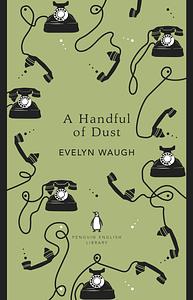Take a photo of a barcode or cover
Bleak, depressing, vicious, but oh so well done. I'd give it five stars if it weren't for the fact that I had to keep stopping because I was annoyed with the characters.
Read for coursework at school and really enjoyed the connection it had with 'The Wasteland' but altogether the story line and characters was interesting and I loved the language Waugh writes in. Normally I start disliking books I have to read for school but I actually liked this one.
If you have read 'The Wasteland' or are about to, you should definitely read this but it is quite deep especially towards the end so it is for older readers.
If you have read 'The Wasteland' or are about to, you should definitely read this but it is quite deep especially towards the end so it is for older readers.
This book surprised me in many ways. I was very surprised by how much I liked it, and the story had many unexpected twists and turns, making it difficult to put down.
Reading this novel was a pretty gleeful exercise in Schadenfreude. Waugh has created a cast of characters who are annoying and petty enough to deserve just what they get. Even the great tragedy in the middle of the book serves as a way to show true ugliness of Brenda Last.
The end of the book is odd - it feels like the whole new story that it is, and I'm not sure that it's put to best use here. (It's an adapted version of a short story Waugh wrote, The Man Who Liked Dickens). It certainly gives the other protagonist, Tony Last, his comeuppance, but it feels tacked on.
Most interesting to me was Brenda's relationship with John Beaver, who has no redeeming qualities whatsoever. Or really horrible qualities, for that matter. He's just a boring person, without a lot of money and with an overwhelming mother. This is all clear to everyone else in London, who ignore him unless they're desperate to fill a seat at their fancy dinner parties, but somehow Brenda falls. I think that John serves more as an escape hatch from her boring life way out in Hetton with Tony, where there are few social occasions and most of the Last fortune goes straight back into maintaining the monstrous gothic mansion.
I very much enjoyed being along for the ride as Waugh poked fun at the social scene of 1930s London. He points out all the absurdities - everyone cheating on their spouse repeatedly, nothing to do but attend various social occasions and discuss said social occasions, staying up until all hours and basically ignoring their children - and exploits them perfectly.
Themes: satire, 1930s, British gentry, Schadenfreude
The end of the book is odd - it feels like the whole new story that it is, and I'm not sure that it's put to best use here. (It's an adapted version of a short story Waugh wrote, The Man Who Liked Dickens). It certainly gives the other protagonist, Tony Last, his comeuppance, but it feels tacked on.
Most interesting to me was Brenda's relationship with John Beaver, who has no redeeming qualities whatsoever. Or really horrible qualities, for that matter. He's just a boring person, without a lot of money and with an overwhelming mother. This is all clear to everyone else in London, who ignore him unless they're desperate to fill a seat at their fancy dinner parties, but somehow Brenda falls. I think that John serves more as an escape hatch from her boring life way out in Hetton with Tony, where there are few social occasions and most of the Last fortune goes straight back into maintaining the monstrous gothic mansion.
I very much enjoyed being along for the ride as Waugh poked fun at the social scene of 1930s London. He points out all the absurdities - everyone cheating on their spouse repeatedly, nothing to do but attend various social occasions and discuss said social occasions, staying up until all hours and basically ignoring their children - and exploits them perfectly.
Themes: satire, 1930s, British gentry, Schadenfreude
Strong character development:
No
Loveable characters:
No
Diverse cast of characters:
No
Flaws of characters a main focus:
Yes
Very dark, at times hilarious, satire. Really enjoyed it.
Starts off interesting, and funny in parts, but falls apart in the boring last third of the book, which focuses mainly on one of the main characters traveling in South America. I’m surprised this one has such a solid reputation. 2.5 stars
Reading Waugh is like being air-kissed by a socialite who clutches your shoulder in mock affection with one hand while raising an ice-pick behind your back with the other. You know you should be on guard for certain disaster, but charisma sweeps you away in an intoxicating wave of champagne and caviar.
Waugh wrote with scathing irony of the plight of English gentry between the two world wars. Sinking into debt and irrelevancy in the wake of the Depression, these bored and bigoted hyphenated lords and ladies flit from ballroom to bedroom, trading partners and gossip as they scheme for invites to the best parties and positions in the right clubs.
The soullessness of these lives would be near impossible to bear if it weren't for Waugh's rapier language and his inclusion of the reader in the Grand Guignol. His satire is deadly (quite literally, in the context of the story, but I shan't spoil the surprises) and oftentimes laugh-out-loud hilarious. David Sedaris and David Mamet owe heaps of inspiration to Waugh's deadpan comedy and rapid-fire dialogue.
"Well, well, well," said Dan, "what next."
"Do I get a drink?" said Dan's girl.
"Baby, you do, if I have to get it myself. Won't you two join us, or are we de trop?"
They went together into the glittering lounge.
"I'm cold like hell," said Baby.
Dan had taken off his greatcoat and revealed a suit of smooth, purplish plus fours, and a silk shirt of a pattern Tony might have chosen for pyjamas. "We'll soon warm you up," he said
"This place stinks of yids, " said Baby.
"I always think that's the sign of good hotel, don't you?" said Tony.
"Like hell," said Baby.
These people are so awful you can't look away. And Waugh is so brilliant you can't stop reading.
Waugh wrote with scathing irony of the plight of English gentry between the two world wars. Sinking into debt and irrelevancy in the wake of the Depression, these bored and bigoted hyphenated lords and ladies flit from ballroom to bedroom, trading partners and gossip as they scheme for invites to the best parties and positions in the right clubs.
The soullessness of these lives would be near impossible to bear if it weren't for Waugh's rapier language and his inclusion of the reader in the Grand Guignol. His satire is deadly (quite literally, in the context of the story, but I shan't spoil the surprises) and oftentimes laugh-out-loud hilarious. David Sedaris and David Mamet owe heaps of inspiration to Waugh's deadpan comedy and rapid-fire dialogue.
"Well, well, well," said Dan, "what next."
"Do I get a drink?" said Dan's girl.
"Baby, you do, if I have to get it myself. Won't you two join us, or are we de trop?"
They went together into the glittering lounge.
"I'm cold like hell," said Baby.
Dan had taken off his greatcoat and revealed a suit of smooth, purplish plus fours, and a silk shirt of a pattern Tony might have chosen for pyjamas. "We'll soon warm you up," he said
"This place stinks of yids, " said Baby.
"I always think that's the sign of good hotel, don't you?" said Tony.
"Like hell," said Baby.
These people are so awful you can't look away. And Waugh is so brilliant you can't stop reading.
Originally published on my blog here in May 2000.
While most of Evelyn Waugh's novels - at least the ones I have read - are humorous with a melancholy side, A Handful of Dust is melancholy with some humour. It is expanded from a short story, The Man Who Liked Dickens, set in the jungle on the borders of British Guiana and Brazil, and is an explanation of what has driven Tony Last to that jungle.
The beginning of this is when boredom drives Tony's wife, tired of country living in the austerity of the early thirties, to have an affair. Tony has no idea what is happening until the death of their only child, in a hunting accident, leads Brenda to announce that she is leaving him. Much of the comedy in the novel occurs here, at its blackest point, when Tony tries to do the honourable thing and give grounds for divorce to protect Brenda from having her affair dragged through the courts.
I prefer Waugh in less sombre mood, and found most of the characters in this novel insufficiently likeable to have really enjoyed it.
Waugh was unable to reprint the short story in the United States, presumably for copyright reasons, and so wrote a new ending, which meant that the American edition bore no trace of the original starting point of the novel. It is reprinted here as an alternative ending, an interesting curiosity.
While most of Evelyn Waugh's novels - at least the ones I have read - are humorous with a melancholy side, A Handful of Dust is melancholy with some humour. It is expanded from a short story, The Man Who Liked Dickens, set in the jungle on the borders of British Guiana and Brazil, and is an explanation of what has driven Tony Last to that jungle.
The beginning of this is when boredom drives Tony's wife, tired of country living in the austerity of the early thirties, to have an affair. Tony has no idea what is happening until the death of their only child, in a hunting accident, leads Brenda to announce that she is leaving him. Much of the comedy in the novel occurs here, at its blackest point, when Tony tries to do the honourable thing and give grounds for divorce to protect Brenda from having her affair dragged through the courts.
I prefer Waugh in less sombre mood, and found most of the characters in this novel insufficiently likeable to have really enjoyed it.
Waugh was unable to reprint the short story in the United States, presumably for copyright reasons, and so wrote a new ending, which meant that the American edition bore no trace of the original starting point of the novel. It is reprinted here as an alternative ending, an interesting curiosity.




